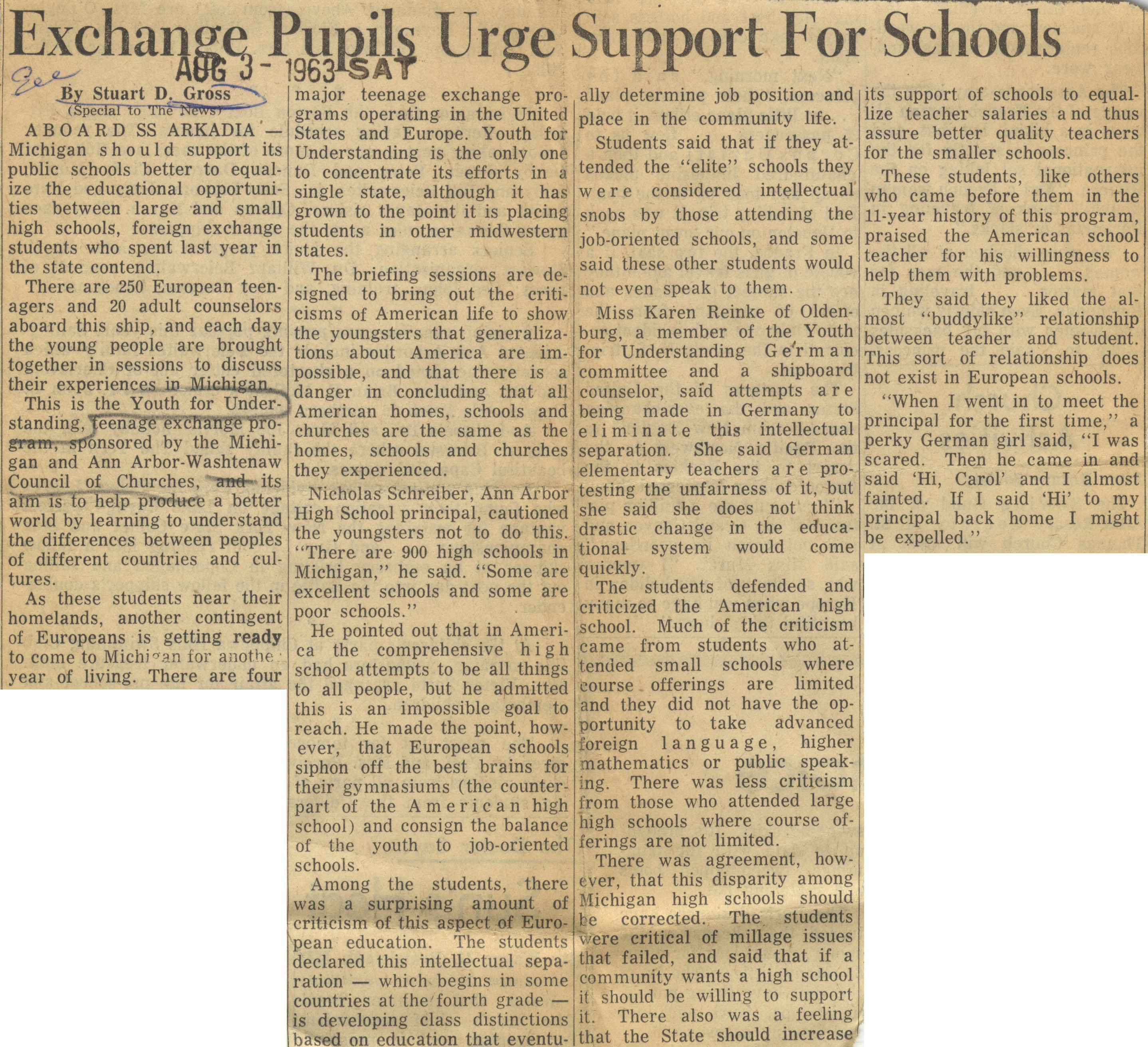Exchange Pupils Urge Support For Schools

Exchange Pupils Urge Support For Schools
By Stuart D. Gross (Special to The News)
ABOARD SS ARKADIA — Michigan should support its public schools better to equalize the educational opportunities between large and small high schools, foreign exchange students who spent last year in the state contend.
There are 250 European teenagers and 20 adult counselors aboard this ship, and each day the young people are brought together in sessions to discuss their experiences in Michigan.
This is the Youth for Understanding teenage exchange program, sponsored by the Michigan and Ann Arbor-Washtenaw Council of Churches, and its aim is to help produce a better world by learning to understand the differences between peoples of different countries and cultures.
As these students near their homelands, another contingent of Europeans is getting ready to come to Michigan for another year of living. There are four major teenage exchange programs operating in the United States and Europe. Youth for Understanding is the only one to concentrate its efforts in a single state, although it has grown to the point it is placing students in other midwestern states.
The briefing sessions are designed to bring out the criticisms of American life to show the youngsters that generalizations about America are impossible, and that there is a danger in concluding that all American homes, schools and churches are the same as the homes, schools and churches they experienced.
Nicholas Schreiber, Ann Arbor High School principal, cautioned the youngsters not to do this. "There are 900 high schools in Michigan," he said. "Some are excellent schools and some are poor schools."
He pointed out that in America the comprehensive high school attempts to be all things to all people but he admitted this is an impossible goal to reach. He made the point however, that European schools siphon off the best brains for their gymnasiums (the counter-part of the American high school) and consign the balance of the youth to job-oriented schools.
Among the students, there was a surprising amount of criticism of this aspect of European education. The students declared this intellectual separation-which begins in some countries at the fourth grade-is developing class distinctions based on education that eventually determine job positions and place in the community life.
Students said that if they attended the "elite" schools they were considered intellectual snobs by those attending the job-oriented schools, and some said these other students would not even speak to them.
Miss Karen Reinke of Oldenburg, a member of the Youth for Understanding German committee and a shipboard counselor, said attempts are being made in Germany to eliminate this intellectual separation. She said German elementary teachers are protesting the unfairness of it, but she said she does not think drastic change in the educational system would come quickly.
The students defended and criticized the American high school. Much of the criticism came from students who attended small schools where course offering are limited and they did not have the opportunity to take advanced foreign language, higher mathematics or public speaking. There was less criticism from those who attended large high schools where course offerings are not limited.
There was agreement, however, that this disparity among Michigan high schools should be corrected. The students were critical of millage issues that failed, and said that if a community wants a high school it should be willing to support it. There also was a feeling that the State should increase its support of schools to equalize teacher salaries and thus assure better quality teachers for the smaller schools.
These students, like others who came before them in the 11-year history of this program, praised the American school teacher for his willingness to help them with problems.
They said they liked the almost "buddy-like" relationship between teacher and student. This sort of relationship does not exist in European schools.
"When I went in to meet the principal for the first time," a perky German girl said, "I was scared. Then he came in and said 'Hi, Carol' and I almost fainted. If I said 'Hi' to my principal back home I might be expelled."